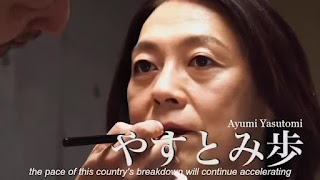Release Year: 2019
Original title: れいわ一揆
Synopsis:
"Reiwa Uprising" (2019) is a remarkable documentary by renowned Japanese filmmaker Kazuo Hara, which chronicles the political journey of Ayumi Yasutomi, a transgender woman and a distinguished professor at the University of Tokyo. The film focuses on her campaign as she vies for a seat in Japan’s Upper House, offering a rare, intimate look into the challenges and triumphs of a marginalized figure seeking to make her voice heard in the political sphere.
Ayumi Yasutomi, born on March 22, 1963, is a respected economist and a member of Japan's political landscape. A professor at the Institute of Advanced Studies on Asia at the University of Tokyo, Yasutomi's career spans a variety of fields, with particular expertise in the economic history of Manchuria and socio-ecological studies of East Asia. Her academic accomplishments have earned her recognition, including the prestigious Nikkei Economics Culture Award. Beyond her scholarly achievements, Yasutomi is known for her advocacy of social causes, including child protection and the promotion of gender equality.
In 2014, Yasutomi made a personal decision to come out as a transgender woman, an act that not only marked a significant moment in her own life but also placed her in the public eye as an advocate for LGBTQ+ rights in Japan. Her coming out and the subsequent evolution of her public persona were central to her political campaign, which the documentary "Reiwa Uprising" captures in compelling detail.
Yasutomi’s academic journey began with her graduation from Kyoto University in 1991, where she earned a degree in economics. She continued her studies at Kyoto, completing her PhD in 1997 with a focus on the financial history of Manchuria. This area of expertise would shape much of her later research, which explored the intricate socio-economic dynamics of East Asia.
Following her graduation, Yasutomi embarked on a career in academia. Her first major role was as a Visiting Research Associate at the London School of Economics in 1996–97. She then moved on to a faculty position at Nagoya University, where she taught until 2000, when she took a position at the University of Tokyo. In 2009, Yasutomi was promoted to Professor after holding several assistant professorships at the university.
Her academic interests have not been limited to economics. She has written extensively on topics such as population dynamics, harassment theory, and the philosophies of Peter Drucker and Confucius. Yasutomi’s research continues to influence contemporary discussions about the socio-economic development of East Asia.
In addition to her academic pursuits, Yasutomi has become increasingly involved in politics. In 2018, she ran for mayor of Higashimatsuyama, a city near Tokyo, advocating for an end to child abuse—a critical issue she has been passionate about throughout her life. Although she lost the mayoral race to incumbent Koichi Morita by a margin of 12,000 votes, her political aspirations did not waver.
In 2019, Yasutomi became one of the ten candidates from the newly-formed Reiwa Shinsengumi party to stand for election to Japan’s House of Councillors. This election marked another significant moment in her political career, as it provided an opportunity to engage more deeply with issues surrounding gender, inclusivity, and social justice. "Reiwa Uprising" documents Yasutomi's determination to challenge the status quo, highlighting the emotional and social obstacles she faced as a transgender candidate in a largely conservative political environment.
Kazuo Hara’s "Reiwa Uprising" provides an intimate portrayal of Yasutomi's bid for political office. The documentary showcases her unyielding dedication to her political beliefs and her commitment to advocating for marginalized communities in Japan, particularly transgender people. Through candid interviews, behind-the-scenes footage of her campaign, and Hara’s unique directorial lens, the film delves into the personal and social challenges Yasutomi faces as she navigates her identity in a predominantly conservative political landscape.
The documentary also serves as a reflection on the broader struggles of transgender individuals in Japan, a society where gender non-conformity is still often met with prejudice. Yasutomi’s campaign is not just a political endeavor; it is a social statement, a powerful act of resistance against the prevailing norms. "Reiwa Uprising" captures both the courage and vulnerability of a trailblazing candidate as she strives to create a more inclusive future.
In addition to her work in politics, Yasutomi is also an author. Her biographical book, "Arinomama no Watashi" (ありのままの私, or "Who I Am"), was published in 2015. In this deeply personal work, Yasutomi reflects on her journey of transition and her experiences as a transgender woman in Japan. The book has resonated with many readers, both within the LGBTQ+ community and beyond, as it provides an honest and heartfelt account of the challenges of living authentically in a society that often does not understand or accept difference.
"Reiwa Uprising" not only sheds light on Yasutomi’s political ambitions but also contextualizes her personal story within the larger framework of social change. The documentary and her memoir both contribute to ongoing conversations about gender identity and human rights in Japan, offering a window into the life of a pioneering figure in the nation’s transgender community. Kazuo Hara’s "Reiwa Uprising" is an essential documentary that highlights the intersection of gender, politics, and social justice. Through the lens of Ayumi Yasutomi’s campaign, the film challenges audiences to confront their assumptions about gender and politics, while providing a rare and powerful look at the life of a transgender politician in Japan. Yasutomi's journey is not just about running for office; it is a profound statement about the importance of visibility, the power of representation, and the need for a more inclusive society. The documentary is a testament to her resilience and her unwavering belief in creating a better, more equitable world for all.
via: youtube
Image credits: YouTube






.jpg)

.jpg)












Post a Comment